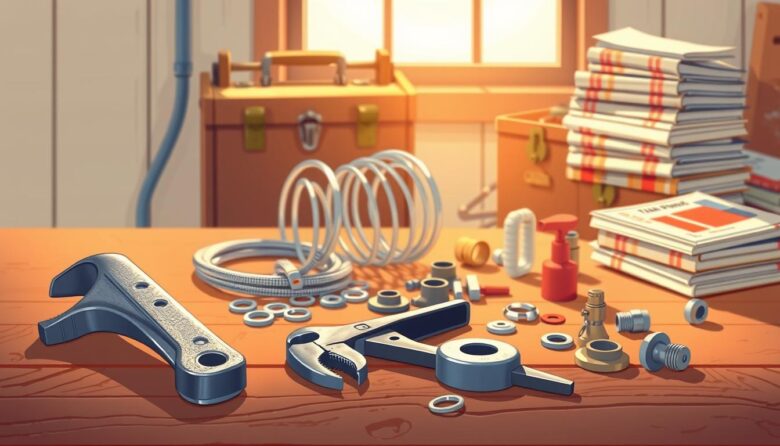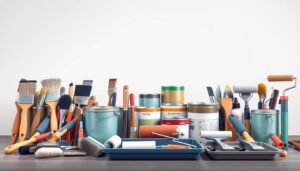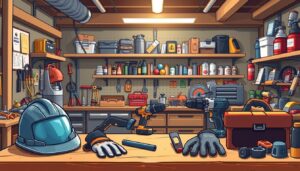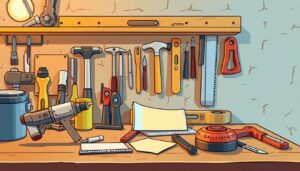Every homeowner faces minor household issues. A dripping faucet or a slow drain can disrupt your day. Having the right gear on hand turns these annoyances into simple tasks.
Proper equipment empowers you to handle common problems with confidence. You can save both time and money by tackling these jobs yourself. This approach avoids waiting for a professional for every small leak or clog.
This guide walks you through the must-have items for a functional toolkit. We cover everything from basic hand tools to more advanced gear. You will learn not only what to buy but also how to use each item effectively.
Investing in quality gear upfront prevents frustration. It ensures your repairs are done correctly the first time. This preparation helps you avoid costly mistakes and recurring issues in your home.
Why Reliable Plumbing Tools Matter
When water-related problems arise at home, the quality of your equipment can determine the outcome. Having trustworthy gear makes all the difference between a quick fix and a prolonged struggle.
Understanding Common Home Plumbing Issues
Most residential calls involve similar problems. Leaky faucets, clogged drains, and running toilets top the list. Dripping pipes and low water pressure also create frequent headaches.
Even minor leaks waste significant water and increase utility bills. Prompt attention with proper equipment saves money and protects the environment. Quality tools ensure these common issues get resolved correctly.
The Impact of Quality Tools on Repairs
Good tools provide precision that cheap alternatives lack. They prevent stripped bolts and cracked fittings during repair work. This precision avoids water damage and mold growth from improper seals.
Investing in reliable equipment saves time and money long-term. A thirty-minute job stays quick instead of becoming a multi-hour ordeal. You avoid calling a professional plumber for simple fixes.
Proper tools protect your entire water system from accidental damage. They build confidence for tackling future plumbing challenges effectively.
Plumbing Essentials for Everyday Fixes
Mastering basic home maintenance requires familiarity with a handful of fundamental instruments and sealing products. This core collection empowers you to address the most frequent issues confidently.
Must-Have Tools: Pipe Wrenches, Basin Wrenches, and More
The pipe wrench is a cornerstone of any toolkit. Its adjustable jaws provide a powerful grip for turning threaded pipes. Professionals often use two together for optimal control.
For sink and faucet work, a basin wrench is indispensable. Its T-shape and swiveling jaw reach nuts in tight spaces behind sinks. This specialized tool simplifies otherwise frustrating tasks.
An adjustable wrench offers incredible versatility. It replaces multiple fixed-size wrenches, accommodating various nuts and bolts. This makes it a go-to for many general plumbing adjustments.
Key Materials: PTFE Tape, Plumber’s Putty, and Sealants
Creating watertight connections is critical. PTFE tape, or thread sealant tape, is wrapped onto pipe threads. This prevents leaks at threaded fittings for water and gas lines.
Plumber’s putty is a malleable compound used under faucet bases and strainers. It creates a flexible seal that blocks water seepage. These materials are as important as the tools themselves.
For an even stronger seal, paste-like pipe thread sealant (“pipe dope”) is used. It is especially vital for gas line fittings to ensure absolute safety. Quality brands like Oatey and Hercules are trusted choices.
Investing in these fundamental plumbing tools and materials forms a solid foundation for your home repairs. With them, you can tackle most common jobs effectively.
Repairing Pipes and Fixtures with Ease
Beyond wrenches and sealants, a specialized set of tools is required for modifying pipes and ensuring secure connections. Proper cutting and fitting are critical for any installation or repair job.
These instruments help you achieve professional results. They prevent future leaks and system failures.
Tools for Precise Pipe Cutting and Fitting
A pipe cutter is indispensable for clean, square cuts on copper, PVC, or steel pipes. This tool uses a sharp wheel that rotates around the pipe for a smooth edge. Clean cuts are essential for leak-proof connections.
They come in different sizes for various pipe diameters. A hacksaw serves as a versatile backup for tight spaces. Always keep the blade tight for accurate cuts.
After cutting, a deburring tool smooths rough edges. This step prevents erosion and ensures fixtures seal properly. Smooth edges are vital for safe water flow.
Pliers provide crucial grip and leverage. They stabilize pipes during work and manipulate small fixtures. Needle-nose pliers are perfect for confined areas.
For professional connections, press fitting systems are a modern solution. Tools like ProPress compress fittings onto pipes quickly. They create reliable seals for water and gas lines without soldering.
Investing in these tools empowers plumbers and DIYers alike. They ensure your water system remains secure and efficient. Quality tools protect your home from damage.
DIY Strategies and Safety in Plumbing Repairs
Successful DIY plumbing work combines practical skills with essential safety protocols. Homeowners can tackle many common issues confidently with the right approach.
Simple Fixes and Preventative Measures
Many household water problems have straightforward solutions. Replacing faucet washers and tightening loose connections are simple tasks. Unclogging drains with a plunger often resolves minor blockages.
Fixing running toilets by adjusting flapper valves is another common repair. Preventative actions reduce emergency situations. Regular pipe inspections help spot corrosion early.
Avoid chemical drain cleaners that damage pipes. Know your main water shutoff valve location. These measures protect your home from major issues.
Best Practices for Working in Tight Spaces
Confined areas under sinks and behind toilets require special techniques. Use tools designed for limited spaces. A basin wrench reaches nuts in cramped spots.
Stubby screwdrivers from Klein Tools or Husky access tight screws. Proper lighting and body positioning prevent strain. Professional plumbers use extended handles for difficult areas.
Always shut off water before starting work. Have buckets and towels ready for cleanup. Test all repairs thoroughly before completion.
Safety equipment is crucial for plumbing tasks. Protective goggles ($15-$20) shield eyes from debris. Heavy-duty gloves ($15-$30) protect hands and improve grip.
Heat shields ($15-$20) prevent fire hazards during soldering. Recognize when to call professionals for complex work involving gas lines.
Choosing the Right Tools for Complex Plumbing Jobs
Advanced plumbing situations demand tools with greater power, precision, and diagnostic capabilities. These specialized instruments help professionals tackle stubborn blockages and complex installations efficiently.
Advanced Equipment: Inspection Cameras and Augers
Modern drain clearing relies on powerful augers and diagnostic cameras. Hand augers use a manual crank to drive cables through sink and shower drains. They effectively break up hair and soap clogs.
For deeper obstructions, motorized snake machines provide extra muscle. These heavy-duty tools reach main sewer lines that manual augers cannot handle. Professional models offer variable speed control.
Inspection cameras have become essential diagnostic tools. These waterproof borescopes snake through pipes to identify blockages and damage. Smartphone-compatible models make them accessible for smaller businesses.
Features to Look for in Adjustable and Specialized Wrenches
Specialized wrenches provide precise control for specific tasks. Faucet keys feature X-shaped designs for various stem fittings. They offer secure grip on outdoor spigots and valves.
PEX systems require specialized tools for proper installation. Pipe expanders widen tubing to accept fittings securely. Quality crimpers ensure leak-proof connections for water lines.
Tube benders create smooth curves in copper pipes without kinking. Plumber’s torches deliver controlled heat for soldering joints. These specialized tools save significant time on complex jobs.
Final Thoughts on Building a Pro Plumbing Toolkit
Empowerment in handling household water issues stems directly from the quality and completeness of your toolkit. This investment pays off by reducing repair costs and building self-sufficiency.
Start with core tools like wrenches, pliers, tape, and sealants. Add specialized gear as your skills grow. Well-made tools from trusted brands last for decades.
Keep your equipment organized and well-maintained. Know when a job requires a professional plumber. With the right gear and knowledge, you can confidently manage most common home water problems.



